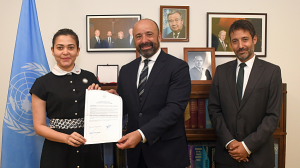
By becoming the first country from Latin America to accede to the Convention on the Protection and Use of Transboundary Watercourses and International Lakes (Water Convention), Panama today made a decisive step to support the sustainable use of transboundary water resources through cooperation across borders.
With slightly over 4 million inhabitants, Panama is at the intersection between Central and South America and located between the Pacific Ocean and Caribbean Sea. Panama is well-endowed with water resources, with approximately 33,000 m³ freshwater per capita available, nearly six times the global average, and mostly relies on surface water resources. Panama shares river basins with Costa Rica and Colombia, and the total area of transboundary river basins represents approximatively 25% of the national territory. The main water uses are industry, agriculture, transport and navigation, drinking water supply, hydropower production, fishing, tourism and environmental services, making cooperation key for the development of the border regions.
Ms. Janaina Tewaney Mencomo, Minister of Foreign Affairs of Panama, stated: “Panama is committed to fostering both a blue and green economy through sustainable use of natural resources. The protection of the environment is a priority for Panama. Our accession to the Water Convention is a crucial engagement that reaffirms our leadership as a blue-green country worldwide, providing our country and continent with one additional tool.”
UNECE Executive Secretary, Ms. Olga Algayerova, stated: “I warmly welcome Panama as the first country from Latin American and the Caribbean to join the Water Convention. The Convention offers a legal framework and institutional platform to boost the highly needed progress on transboundary water cooperation in the region. I strongly encourage other countries from the region to join the Water Convention, and for those that are already in the process, to accelerate accession efforts to reap the benefits of this proven instrument for water cooperation.”
The main transboundary river basin for Panama is the Sixaola, located in the border region with Costa Rica, which is home to important biodiversity and agricultural activities, and is of cultural importance with the presence of indigenous peoples and Afro-Caribbean populations. Panama and Costa Rica are working together to coordinate the development of the Sixaola River basin through a Binational Commission, and it is expected that the implementation of the Water Convention will help operationalize monitoring and data-sharing systems on water quality, quantity, and use, that in turn will help to identify trends and potential problems and support evidence-based decision-making.
It is also foreseen that the Convention will support cooperation between Panama and Colombia, by increasing capacity for effective water governance and trust, based on clear rights and obligations.
153 countries worldwide share rivers, lakes and groundwater resources. Open to accession by all UN Member States since 1 March 2016, the Convention now counts 51 parties. At present, there are several countries in Latin America and the Caribbean in the process of accession, including the Dominican Republic, El Salvador, Costa Rica, Paraguay and Uruguay. The UN Water Convention is serviced by the United Nations Economic Commission for Europe (UNECE).

